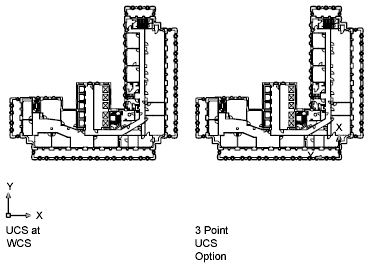You can relocate and rotate the user coordinate system for convenient coordinate entry, grid display, grid snap, Ortho mode, and other drawing tools.
Understand the World and User Coordinate Systems
There are two coordinate systems: a fixed system called the world coordinate system (WCS) and a movable system called the user coordinate system (UCS). By default, these two systems are coincident in a new drawing.
Normally in 2D views, the WCS X axis is horizontal and the Y axis is vertical. The WCS origin is where the X and Y axes intersect (0,0). All objects in a drawing file are defined by their WCS coordinates. However, it is usually more convenient to create and edit objects based on the movable UCS.
Work with the User Coordinate System
Virtually all coordinate entry as well as many other tools and operations reference the current UCS. 2D tools and operations that depend on the location and orientation of the UCS include the following:
Moving or rotating the UCS can make it easier
to work on particular areas of a drawing. 
You can relocate the user coordinate system with methods such as the following:
Each of these methods have a corresponding option in the UCS command. Once you have defined a UCS, you can name it and then restore it when you need to use it again.